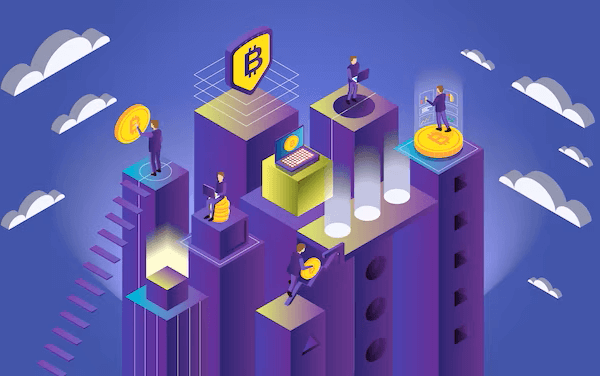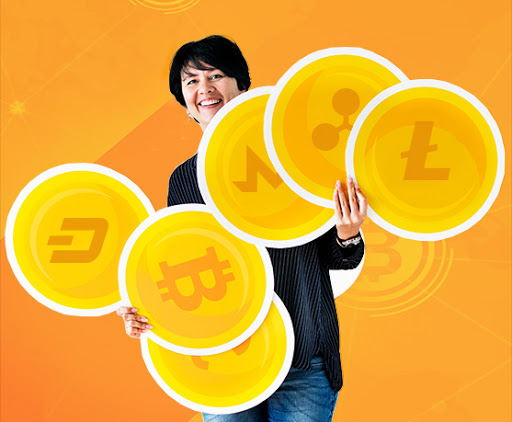Decentralized Cryptocurrency Exchanges (DEXs)
A Decentralized Exchange (DEX) operates as a peer-to-peer marketplace, enabling direct transactions between cryptocurrency traders. DEXs actualize a fundamental potential of cryptocurrency: enabling financial transactions without the involvement of traditional intermediaries such as banks or brokers. Several well-known DEXs, including Uniswap and Sushiwap, are built on the Ethereum blockchain, exemplifying this new approach to financial exchanges.

How do DEXs work?
In contrast to Centralized Exchanges, Decentralized Exchanges operate exclusively with cryptocurrency tokens, facilitating trades between different types of tokens without involving fiat currencies. They function through a set of smart contracts and determine the prices of cryptocurrencies algorithmically. DEXs use “liquidity pools,” where investors can lock in their funds in return for interest-like rewards, to enable trading.
Another key difference is how transactions are recorded. In centralized exchanges, transactions are logged in the exchange’s internal database. In DEXs, however, transactions are settled directly on the blockchain, offering a different level of transparency and security. DEXs are typically built on open-source code, allowing anyone to review their mechanisms. This transparency also enables developers to use existing code as a foundation for creating new projects.
Interacting with a Decentralized Exchange (DEX)
It involves a series of steps that are distinct from those used in traditional, centralized exchanges. Here’s a general overview of how you typically interact with a DEX:
- Set Up a Digital Wallet
- Add Funds to Your Wallet
- Connect Your Wallet to the DEX
- Choose a Trading Pair
- Execute a Trade
- Monitor for Transaction Completion
- Liquidity Pools and Swapping
- Stay Informed and Secure
However, you also need to remember that each DEX can have its own specific features and requirements, so it’s important to familiarize yourself with the DEX’s user guide or help resources. Additionally, always be aware of the risks involved in using DEXs, including smart contract vulnerabilities and the volatile nature of cryptocurrency markets.
What are potential benefits of using a DEX?
Using a Decentralized Exchange (DEX) offers several potential benefits. Some of them are mentioned below:
- Diverse Range of Tokens: DEXs are a hotspot for discovering new and emerging tokens. They provide access to a wide variety of tokens, from well-established ones to new and obscure projects. This variety is possible because anyone can mint an Ethereum-based token and set up a liquidity pool for it on a DEX. This means you’ll encounter a broader spectrum of projects, both reputable and untested. However, this also implies a higher level of risk, so caution is advised.
- Reduced Hacking Risks: In a DEX, the funds involved in a trade are stored in the traders’ own wallets, not held by the exchange. This setup theoretically lowers the risk of funds being lost in a hack. Additionally, DEXs diminish what’s known as “counterparty risk” – the risk that one of the parties involved in the transaction, including a central authority in traditional finance, might default.
- Anonymity: Most popular DEXs do not require users to provide personal information. This feature ensures a high level of anonymity for users, differentiating DEXs from many centralized exchanges that require personal identification for regulatory compliance.
- Utility in Developing Economies: DEXs are becoming increasingly popular in developing countries, where traditional banking infrastructure may be lacking. The peer-to-peer lending, quick transaction processing, and anonymity offered by DEXs are particularly advantageous in these regions. Essentially, anyone with a smartphone and internet access can engage in trading via a DEX, making it a powerful tool for financial inclusion.
What are some potential downsides?
Navigating decentralized exchanges (DEXs) can be significantly more complex compared to their centralized counterparts. The user interfaces on DEXs often require specialized knowledge and are not always intuitive, which means new users should be prepared to undertake a lot of research. Unlike centralized exchanges, DEXs typically don’t offer much in the way of guidance or handholding, so users generally need to seek information through external resources, such as community forums or educational websites, to understand how to use these platforms effectively. This learning curve is important because the potential for making unfixable errors, like sending coins to the wrong wallet, is higher on DEXs.
Another challenge with DEXs relates to the concept of “impermanent loss,” particularly common when contributing to a liquidity pool. This issue arises when pairing a more volatile cryptocurrency with a less volatile one, leading to potential financial losses due to the fluctuating values of the paired assets. Users need to be aware of this risk when participating in liquidity pools.
The security of any DeFi protocol is inherently tied to the smart contracts that power it. Despite rigorous testing, these contracts can contain bugs or vulnerabilities that might be exploited, leading to the loss of tokens. Furthermore, while a smart contract may function perfectly under normal conditions, it’s impossible to anticipate every rare event, human error, or sophisticated hack. This uncertainty adds an additional layer of risk to using DEXs.
The vast array of tokens available on most DEXs, including many unvetted ones, also introduces the risk of scams and fraudulent schemes. A common scam in the DeFi space is the “rug pull,” where the creator of a token suddenly mints a large number of tokens, diluting the pool and crashing the token’s value. Therefore, it’s crucial for users to conduct thorough research before buying a new cryptocurrency or experimenting with a new protocol. This research should include reading white papers, following developer updates, and checking for audits by reputable firms. Engaging with the community and staying informed are key strategies for navigating the complex and often risky world of DEXs.
LATEST CRYPTOCURRENCY NEWS
YOU CAN WIN $200 EVERY HOUR




